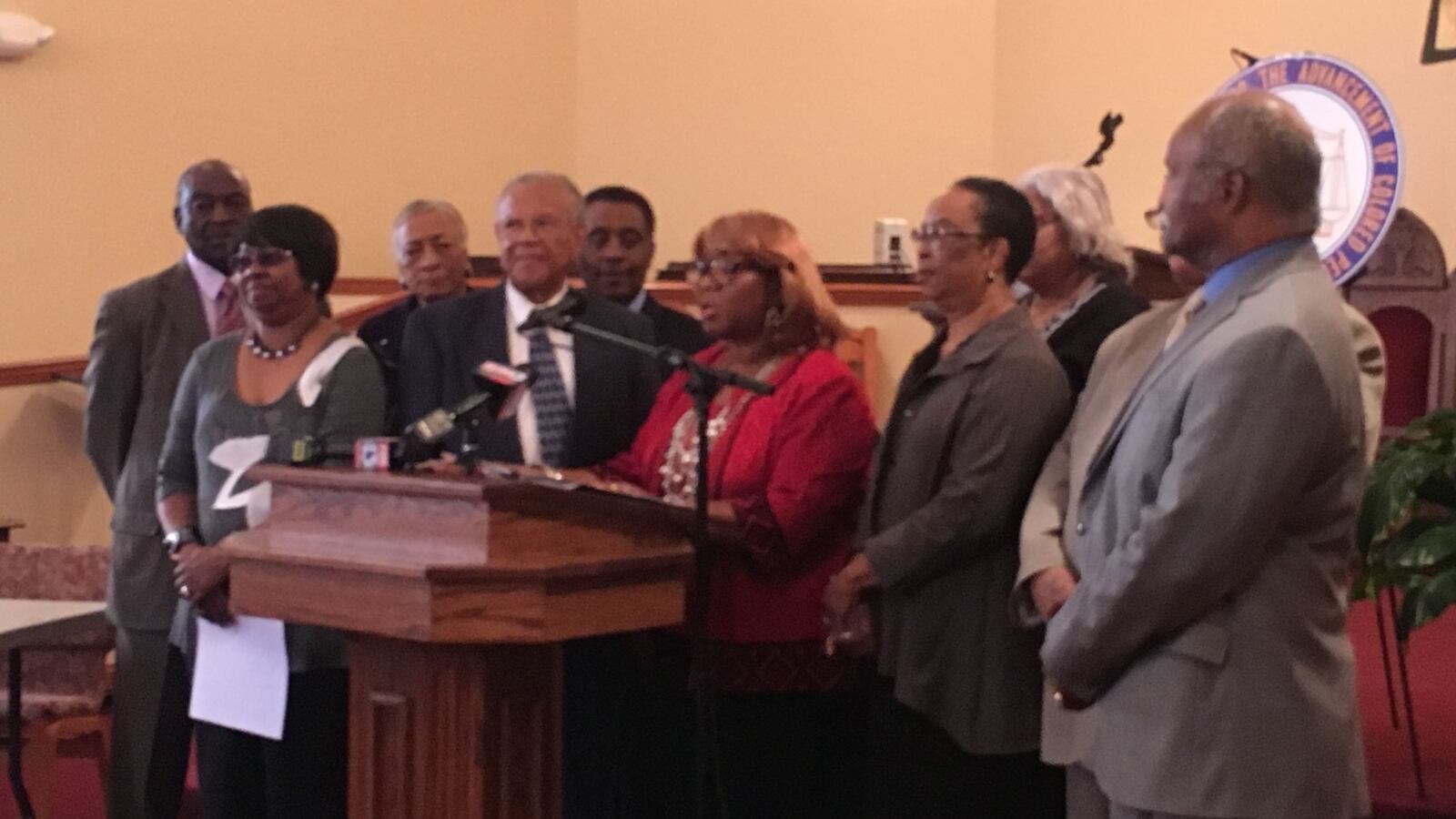Tennessee’s NAACP leaders on Tuesday distanced the state organization from its national board’s call for a moratorium on charter schools, even calling the charter-reliant work of the state-run school district “a progressive spot” in Memphis.
Gloria Sweet-Love, president of the NAACP Tennessee State Conference, said problems associated with charter growth elsewhere in the nation aren’t as prevalent in the Volunteer State, where authorization is restricted to local school districts and the state.
“In Tennessee, we have some of the best oversight laws,” Sweet-Love said at a press conference at First Baptist Church Broad in Memphis, just three weeks after the national board’s vote.
“If the guys here in Memphis don’t do right, you got elected school board members who are part of the (local education agency) that school has to respond to. That is not happening all over the nation,” she said.
The state group’s position, which is supported by the NAACP’s Memphis chapter, represents an about-face from Memphis leaders’ call earlier this year for a moratorium on expanding the state-run Achievement School District, or ASD, which uses mainly charter operators to turn around chronically struggling schools. That call came in response to a Vanderbilt University study labeling the ASD’s results marginal thus far and suggesting the city’s low-performing schools would be better off in Shelby County Schools’ Innovation Zone.
“I believe we’ll work through this,” Sweet-Love said, referring to ASD oversight and performance. “I believe the ASD is at a progressive spot now. I believe they’re moving to do some things to be more involved with the community.”
Sweet-Love said the state conference will advocate for “tightening” guidelines and legislation on how the state allocates funding for charters, referencing a recent state comptroller’s report citing “insufficient clarity, transparency, and verification” in how local school districts distribute that money.
The NAACP’s national board, which includes three Memphians, has instructed its chapters to advocate for legislation for a “reasoned pause” on the expansion of the charter sector nationwide until those concerns could be addressed. The vote puts Memphis in an unique position as home to both one of the nation’s largest NAACP chapters and a burgeoning charter school sector. The call also coincided with initiatives by Shelby County Schools to strengthen oversight of district-authorized charter schools and to tweak its process for revoking charters after receiving a strong reprimand from Tennessee’s State Board of Education about closing several schools this year.
Sweet-Love, who lives near Memphis in Brownsville, also serves on the NAACP’s national board and has been appointed to a task force examining charter schools. She reiterated the organization’s concerns about racial disparity in student discipline and the impact of limited funds on traditional schools.
Tennessee NAACP press conference from Chalkbeat Tennessee on Vimeo.
Tuesday’s press conference was attended by about 35 representatives from student, parent and charter school advocacy groups such as the Tennessee Charter School Center, Stand for Children and Memphis Lift, as well as the ASD. All were invited to stay afterward for a discussion that was closed to news organizations.
To some in attendance, the messaging shift was out of step with the spirit of the national call to stop charter school expansion. To others, the shift was not enough.
State Rep. G.A. Hardaway said he mostly supports the national NAACP’s position because he believes charter schools have strayed from their original purpose.
“My original perception of charter schools was here’s a chance to look at and develop best practices,” said Hardaway, founder of one of Tennessee’s first charter schools, Memphis Academy of Health Sciences. “We got away from quality when we took the cap off. … It was an open door for a lot of players not capable of delivering quality education.”
Local education leaders contacted later by Chalkbeat weighed in on the discussion.
Stephanie Love, a school board member for Shelby County Schools, said problems cited by the national NAACP board exist in Tennessee. She gets calls from involved parents at charter schools who have not been informed of charter board meetings or grievance processes, she said.
“Charters should be held to the same standard (as local school districts) because we’re all taking public dollars,” said Love, adding that transparency and accountability issues by locally authorized charters are being addressed by the district’s charter advisory committee. “And if that’s not happening in every charter school, we do have an issue.”
Keith Williams, who leads a leading teachers union in Memphis, echoed Love’s concerns.
Charter schools “may be public, but (their boards) are not elected. There’s no way you can put that up against public scrutiny. … It should not be at the expense of schools in the district,” said Williams, executive director of the Shelby County Education Association.
But Bobby White, the ASD’s chief of external affairs, praised the position voiced by Sweet-Love and said the national board’s call was too broad.
“She gets it and she knows what’s good about charter schools,” he said. “A few bad actors in a few bad places can make a stereotypical view of charter schools and how they operate. … The dynamics that led to this wide-ranging thought just don’t exist in Tennessee.”
Tennessee’s NAACP conference plans to conduct community meetings to take feedback to the national organization’s task force.
Teresena Wright, who works for Memphis Lift, said involving parents in the discussion is paramount. Her parent advocacy organization disrupted the national board meeting in Cincinnati over the organization’s stance, which Wright said has caused a rift between charter parents and the NAACP.
“That national issue is not a Tennessee issue, but it became a Tennessee issue because it had been nationally voted on,” she said.

